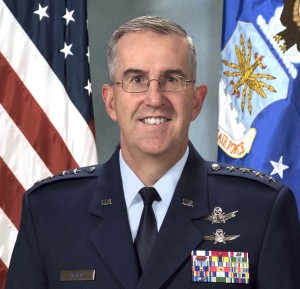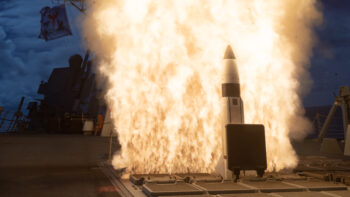 AFA CONFERENCE: One of the rules that goes with a Continuing Resolution is that no new weapon programs can be started — unless Congress comes up with money and provides a waiver. And it looks as if Congress is likely to adopt a CR at the end of the month unless we all get very lucky. Gen. John Hyten, head of Air Force Space Command, told reporters here that a raft of classified space programs will be stalled, as will the effort to replace the Russian RD-180 rocket engines.
AFA CONFERENCE: One of the rules that goes with a Continuing Resolution is that no new weapon programs can be started — unless Congress comes up with money and provides a waiver. And it looks as if Congress is likely to adopt a CR at the end of the month unless we all get very lucky. Gen. John Hyten, head of Air Force Space Command, told reporters here that a raft of classified space programs will be stalled, as will the effort to replace the Russian RD-180 rocket engines.
“All that stuff just gets put on hold. It’s just bad. I wish I could come up with a better word than bad but I can’t,” Hyten told reporters here today. “It’s just the wrong message to send to the world, especially right now.”
You can be sure Sen. John McCain will not want to hear that there may be delays to the RD-180 replacement. But as chairman of the Senate Armed Services Committee, he can’t create money, he can only authorize its use. The money for the replacement would have to be new money. The several hundred million dollars Congress has given the Air Force so far falls under the current launch program, the Evolved Expendable Launch Vehicle (EELV).
But it is the classified programs that are of real military and diplomatic significance. While Hyten wouldn’t confirm or deny which classified program would be affected, he did confirm that the major strategic effort to boost Intelligence Community and DoD counterspace spending by $5 billion would be stopped in its tracks by a CR. Apparently much of that goes for new programs.
One of the most interesting things Hyten said — clearly meant as a military to military signal — was this. “All you have to know about the likely threats it is that they are the near peer competitors of China and Russia,” he said. To influence those competitors, the US wants them to know what they face: Part of that effort is signaling those countries. “Why do you think it is that we released the GSSAP (Geosynchronous Space Situational Awareness Program) program last year from back to white? It was to make sure we sent a message to the world that anything you do in geosynchronous orbit we can see. Everything.”
Hyten sent another signal, both to the Russians and Chinese and to the space community. GSSAP is not yet checked out but Hyten received two requests from other quarters to surveil something. “It’s performed remarkably,” he said, adding that it “worked just like it was supposed to. The pictures we gave them are truly eye watering. You don’t often get to see satellites flying, but we got to see satellites flying.”
In other news, Hyten made clear just how tentative work on the new JICSPOC is as the military and IC battle it out over who would command space assets in the event of an attack. It will be based at Schriever Air Force Base. It will have only one person who’s been reassigned from Afghanistan. It will focus on space control experiments and developing new Concepts of Operations (CONOPS) for the next nine months, Hyten told us.
UPDATE BEGINS “It is actually a very simple construct… but it’s been misrepresented in many different ways” by the media, Hyten said later at the last panel of the day. He wouldn’t even discuss the idea that the new JICSPOC might serve as a backup command post or even a replacement for the existing Joint Space Operations Center (JSPOC).
The JSPOC does a great job of space traffic control — including telling the Russians and Chinese when dangerous debris is heading towards their satellites — and of channeling space support to US forces around the world, Hyten said. But, he went on, “what it doesn’t do well today — and there’s obvious reasons for that — is it doesn’t prepare well for a fight that might one day extend into space. If that fight ever does, God forbid, extend into space some day, we need to be ready for it.”
“We really don’t have a place to exercise that. so we decided with our partners in the intelligence community [that] we’re going to put a small facility at Schriever Air Force Base…to experiment and explore how what we need to do and how we need to operate,” Hyten said. Does the JICSPOC have a role beyond that? He wouldn’t say. UPDATE ENDS
Sydney Freedberg contributed to this story.
Major trends and takeaways from the Defense Department’s Unfunded Priority Lists
Mark Cancian and Chris Park of CSIS break down what is in this year’s unfunded priority lists and what they say about the state of the US military.



























